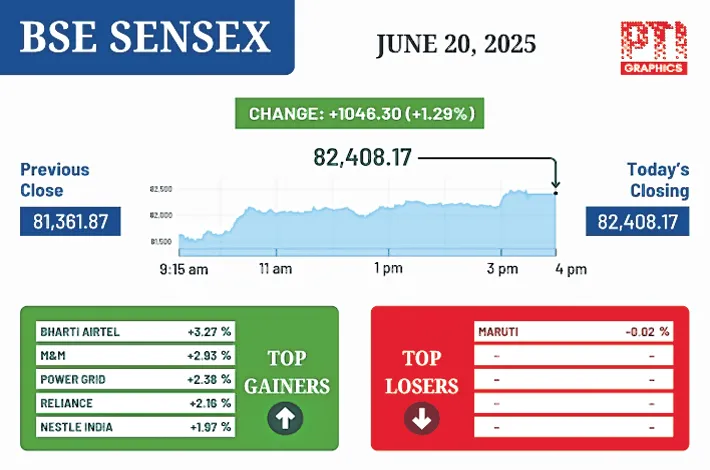Markets recover amid easing Mideast tension
21-06-2025 12:00:00 AM

Financial sector stocks surge; investors upbeat about macros
Markets recovered on Friday amid signs of easing tension in the Middle East. Reports that US talks with Iran are imminent, and the European policymakers are expected to press Iran to curtail nuclear activities, boosted the sentiment.
Mirroring the improved undertone, after a flat start, the 30-share BSE Sensex surged 1,046.30 points (1.29%) to close at 82,408.17. The 50-share NSE Nifty settled 319.15 points (1.29%) higher at 25,112.40.
RBI’s decision to ease and rationalise project financing norms has further enhanced investor confidence, especially in financial sector stocks. The stock of Power Finance Corporation surged 4.92%, HUDCO soared 4.72%, Indian Renewable Energy Development Agency jumped 4.03%, REC rallied 2.96% and Indian Railway Finance Corporation climbed 1.47% on the BSE.
Nevertheless, intelligent investors are closely monitoring geopolitical situations as the US has been beefing up its forces in the region. The conflict has entered its second week, and Israel and Iran are continuing to exchange fire.
Reports were there that a third US Navy destroyer had entered the eastern Mediterranean Sea, and a second US carrier strike group “is heading toward the Arabian Sea”. Profit-booking should be there again, and investors shouldn’t waste time, and never panic. After the Iraq war, talks on the Pentagon were rare, but investors have started talking about the Pentagon again. Saturday and Sunday are crucial,” senior analysts said.
Economists from Goldman Sachs forecast for Federal Reserve policy is unchanged. They expect the first of three policy rate cuts in December, followed by two more in 2026 to a terminal rate of 3.5-3.75%.
“While the US dollar has lost some value this year, the case for a dramatically weaker dollar has become somewhat overstated,” Gurpreet Garewal of Goldman Sachs Asset Management said on Friday. Garewal acknowledges that “global investors have become concerned about US policy and see improving opportunities elsewhere.”
This, combined with the widespread perception that the dollar has been overvalued, has contributed to the dollar's loss of value compared with a basket of major currencies. Indeed, while US stocks have recovered from their post-tariff-announcement drop, the country's currency has not, he said.
But Garewal points out that the dollar “remains dominant in global foreign exchange reserves, and no alternative matches its scale and liquidity”—meaning that its status as the world's reserve currency appears secure.








